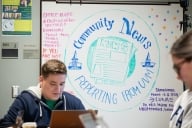You have /5 articles left.
Sign up for a free account or log in.
The National Federation of the Blind (NFB) has now asked the Department of Justice to investigate two more institutions, New York and Northwestern Universities, for alleged violations of the Americans with Disabilities and the Rehabilitation Act. Last time around, when the NFB went after a few other institutions, including Reed College, it was for a pilot project on the Kindle. This time it is for implementing Google Apps, which, I am told, is also inaccessible to the blind as were the navigation tools on the Kindle DX.
Many people have addressed the tourniquet effect of the strategy. Let me attempt a brief summary. Technological devices are still in the formative stage comparable to early car design. Does the brake go on the left or the right? At some point, discovery, design and market pressure establish standards that will remain fixed for a lifetime. Advocacy groups, such as the NBF, believe that they have a brief window of opportunity to raise awareness and alter technological design of information technology devices in a way that is, in a word, accessible to them as they would be for those who are sighted.
Individuals or groups can bring cases against the companies. Remember the successful case against Target for the inaccessible web site? But how much more powerful of a statement and public relations tour de force is it to amplify the message through higher education.
Many of us in higher education, not least me, squawked because we perceived that once again we have been caught in the middle. And now we see that our voices gave the issue more attention. The NFB can leverage us for our freedom of speech, our lobbying power in Washington and perhaps even innovative research in the area of accessible technology and design. Brilliant!
Last night I had a conversion experience. When this issue first emerged I stood among those that squawked. Expressing complete sympathy with the ultimate goals of the NFB, I nonetheless expressed great dismay that once again, like in the copyright wars, higher education was caught in the middle of a battle that raged far beyond our domain.
But I have changed my mind. Oh sure, I get it. We are being used. It is not the first time, and I suspect for complex reasons that include rapacious greed, it will not be the last. On this last point, unlike the copyright wars or even the myriad for-profit companies that daily bite into our “market share” (look at me, using their term, as if higher education was a market to share instead of a distinct institution designated by law to serve the society in particular and important ways), this pressure is not motivated by greed. It is motivated by legitimate need. Moreover, we are not the “conduit” I.S.P. We are the entity that has the responsibility to meet legal accessibility standards, even as those standards change with new technologies. So, go ahead and put the fix on us, NFB. Your tactics may be Machiavellian in the extreme, but I understand why we make good means to the end.
Higher education, this is the clarion call to take a courageous leadership position. Instead of focusing on the fairness issue – it's not -- we should nonetheless get on top of this one. Stop the unimpeded march of adopting technologies that fail to build accessibility into their design. Embrace the obvious and relatively easy accessibility within our own walls, whether it be in physical or cyberspace, that we can control and accommodate without having students or employees go through a long, individual process every time they simply want to take a course or do their job. Let's use the power of teaching, research and outreach to break down the stereotypes that reinforce discrimination. Weave the goals of accessibility into our missions.
That stand may provide the kind of courage we need to rethink the entire outsourcing model, whether from arguments of community source or institutional autonomy. Hand to the heavens, I make this claim genuinely on behalf of accessibility even though I also have opinions on these issues.
I mention them in order to recognize that this one issue of accessibility is of a piece with other issues and should not, as it often is, marginalized to the alleged and mistaken “1%” of people with disabilities. But those other positions are not driving my passion. Belief is the motivation, which I suppose, as a conversion experience, places me smack dab in the middle of a great tradition.






